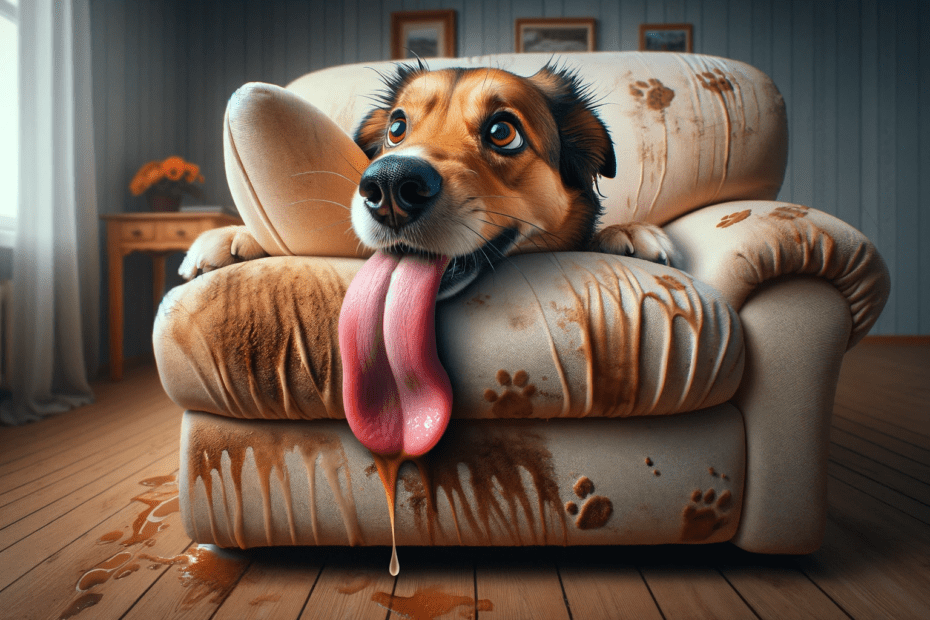This article aims to delve into the perplexing behavior of dogs licking the couch. By exploring the psychological, sensory, medical, and behavioral aspects of this peculiar habit, we seek to shed light on its underlying causes.
Through a scientific lens, this analysis will provide valuable insights into why dogs engage in this behavior and offer practical solutions to address and prevent it.
Understanding the motivations behind couch licking will foster a deeper understanding of our canine companions and promote their overall well-being.
Key Takeaways
- Couch licking in dogs can be caused by psychological reasons such as anxiety, stress, and boredom.
- Dogs may also lick the couch as a form of sensory exploration, driven by their strong sense of taste and fascination with textures.
- Medical conditions like allergies, gastrointestinal issues, and inflammatory bowel disease may contribute to couch licking.
- Behavioral issues, particularly anxiety, are often associated with couch licking, and creating a stable and stimulating environment can help reduce this behavior.
Psychological Reasons for Couch Licking
In the context of dogs licking the couch, a common psychological reason behind this behavior is due to anxiety or stress. Dogs, as social animals, can experience various forms of anxiety, which may manifest in behaviors such as excessive licking. Licking the couch can serve as a coping mechanism for dogs dealing with feelings of unease or nervousness.
Anxiety-induced couch licking can occur in response to various triggers, such as separation anxiety when the owner is away or during periods of change or uncertainty in the dog’s environment. When feeling anxious, dogs may seek comfort in repetitive behaviors like licking, which can provide a temporary sense of relief.
Furthermore, boredom can also contribute to couch licking. Dogs that lack mental stimulation or physical activity may resort to licking as a means of occupying themselves. Boredom-induced licking can be seen in dogs left alone for extended periods or those with limited opportunities for play and exploration.
Understanding the psychological reasons behind couch licking is essential for addressing this behavior effectively. By identifying and addressing the underlying causes of anxiety or boredom, owners can implement appropriate strategies to help their dogs cope, such as providing mental and physical stimulation, creating a safe and comfortable environment, and seeking professional guidance if necessary.
Sensory Exploration Through Couch Licking
One primary motivation behind dogs licking the couch is their innate drive for sensory exploration. Dogs possess a highly developed sense of taste and are often driven to explore new textures and flavors. When a dog licks the couch, it may be trying to satisfy its taste preference or simply engaging in texture fascination.
Dogs have a keen sense of taste, with a significantly higher number of taste buds than humans. This allows them to detect and differentiate a wide range of flavors. By licking the couch, dogs may be trying to taste various substances that have been absorbed into the fabric, such as food crumbs or spilled liquids. Additionally, dogs may have specific taste preferences, and licking the couch allows them to explore and satisfy these preferences.
Texture fascination is another driving force behind dogs licking the couch. The texture of the couch fabric may provide a unique sensory experience for dogs. They may enjoy the feel of the fabric against their tongues or find pleasure in the repetitive motion of licking. This behavior can be particularly pronounced in dogs with certain sensory sensitivities or compulsive tendencies.
Medical Conditions That May Cause Couch Licking
Certain medical conditions can lead to dogs engaging in couch licking behavior. Allergies can be a significant cause of this behavior. Dogs with allergies may lick the couch as a way to relieve itching or discomfort caused by the allergic reaction. Allergies can be triggered by various factors such as certain foods, pollen, dust mites, or even certain fabrics used in the couch upholstery.
Dogs may also develop gastrointestinal issues that can result in couch licking. Gastrointestinal problems like acid reflux or an upset stomach can cause dogs to lick the couch in an attempt to alleviate their discomfort. Dogs with conditions such as inflammatory bowel disease or pancreatitis may also engage in couch licking behavior due to the pain or discomfort associated with these conditions.
It is important to identify and address any underlying medical conditions that may be causing couch licking in dogs. Consulting with a veterinarian can help determine the cause of the behavior and develop an appropriate treatment plan to alleviate the dog’s discomfort and reduce couch licking.
Behavioral Issues Associated With Couch Licking
Dogs may exhibit couch licking behavior due to underlying behavioral issues. One of the primary factors contributing to this behavior is underlying anxiety. Dogs, like humans, can experience anxiety, and they may resort to licking the couch as a coping mechanism. This behavior may provide them with a sense of comfort and security.
Environmental factors can also play a role in dogs licking the couch. A stressful or unstable environment can contribute to a dog’s anxiety, leading to compulsive behaviors such as couch licking. Changes in the household, such as a new pet, a move to a new location, or the introduction of unfamiliar people, can trigger anxiety in dogs and result in this behavior.
It is essential to address the underlying anxiety and environmental factors to help dogs overcome couch licking behavior. Providing a stable and predictable environment can help reduce their anxiety levels. Engaging in regular exercise and mental stimulation can also help alleviate anxiety in dogs. Additionally, seeking professional assistance from a veterinarian or animal behaviorist may be beneficial in developing a behavior modification plan tailored to the specific needs of the dog.
How to Address and Prevent Couch Licking Behavior
To effectively address and prevent couch licking behavior in dogs, it is crucial to establish clear boundaries and provide appropriate alternatives for self-soothing. Training techniques can play a significant role in modifying this behavior.
Consistency is key when training dogs, as they thrive on routine and clear expectations. One effective approach is redirection, where the dog is redirected to an appropriate chewing option whenever they start licking the couch. This alternative chewing option should be enticing and appealing to the dog, such as a chew toy or a dental bone. Providing a variety of textures and flavors can help keep the dog engaged and satisfied.
It is also important to ensure that the dog’s physical and mental needs are adequately met. Regular exercise and mental stimulation through interactive toys and puzzles can help alleviate anxiety or boredom, which may contribute to couch licking behavior. Additionally, creating a designated space for the dog to relax and feel secure, such as a comfortable dog bed or crate, can help reduce the urge to lick the couch.
Frequently Asked Questions
Can Couch Licking Behavior in Dogs Be a Sign of Separation Anxiety?
Couch licking behavior in dogs can indeed be a sign of separation anxiety. Separation anxiety is a common behavioral issue in dogs that manifests when they are left alone. While couch licking may not be the sole indicator of separation anxiety, it can be a symptom of the underlying issue.
To address separation anxiety, various behavioral training techniques can be employed, such as desensitization and counterconditioning. Additionally, providing environmental enrichment, such as toys and interactive puzzles, can help alleviate separation anxiety in dogs.
Are Certain Dog Breeds More Prone to Couch Licking Behavior Than Others?
Certain dog breeds may be more prone to couch licking behavior than others. This behavior can be influenced by a variety of factors, including breed characteristics and individual temperament.
While it is difficult to generalize across all breeds, some breeds known for their oral fixation or high energy levels may be more likely to engage in excessive licking behaviors. However, it is important to note that each dog is unique, and environmental factors and individual experiences can also contribute to couch licking behavior.
Further research is needed to fully understand the relationship between dog breeds and couch licking behavior.
Does Age Play a Role in Dogs’ Tendency to Lick the Couch?
There is a growing interest in understanding the factors that contribute to a dog’s tendency to lick the couch.
One question that arises is whether age plays a role in this behavior. Researchers have investigated whether there is a correlation between a dog’s age and their likelihood to lick the couch.
Can Excessive Couch Licking Lead to Health Problems in Dogs?
Excessive couch licking in dogs can potentially lead to health problems. The repeated licking can cause irritation and inflammation of the skin, leading to dermatitis.
Dogs may also ingest harmful substances present on the couch, such as cleaning chemicals or allergens, which can result in gastrointestinal issues.
It is important for dog owners to address this behavior through training techniques, redirecting the dog’s attention to appropriate chewing toys or providing alternative surfaces for licking.
Are There Any Natural Remedies or Deterrents to Prevent Dogs From Licking the Couch?
Natural remedies and deterrents can be effective in preventing dogs from licking the couch. These methods aim to redirect the dog’s behavior and discourage them from engaging in this behavior.
Natural remedies such as bitter sprays or essential oils can be applied to the couch to make it unappealing for dogs to lick.
Additionally, providing alternative outlets for licking, such as chew toys or interactive puzzles, can help redirect their attention.
Consistency and positive reinforcement are key in successfully implementing these deterrents.
Conclusion
In conclusion, dogs may lick the couch for various reasons. These reasons include psychological factors, sensory exploration, medical conditions, and behavioral issues. Understanding these underlying causes is crucial in addressing and preventing this behavior.
By implementing appropriate training techniques, dog owners can effectively manage and redirect their pet’s couch licking behavior. Providing alternative outlets for sensory exploration can also help divert their attention away from the couch. Additionally, seeking veterinary advice for potential medical conditions is important in ensuring the health and well-being of the dog.
In summary, it is important for dog owners to understand the reasons behind their pet’s couch licking behavior. By addressing these underlying causes through training, providing alternative outlets, and seeking veterinary advice, owners can effectively manage and prevent this behavior.






